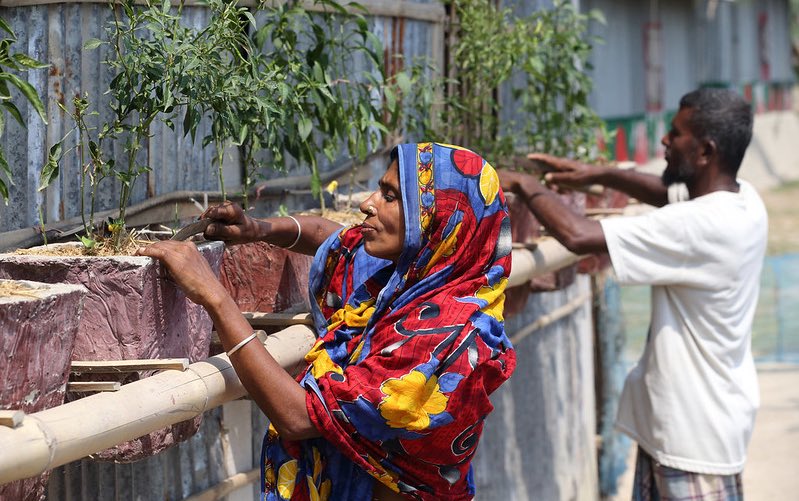The growing emphasis on sustainability of food systems (rather than of agriculture alone) highlights the importance of considering gender at all stages, from production to consumption, to address development goals of zero hunger, sustainable agriculture, and climate action (as well as gender equality as a goal in itself). IFPRI’s Gender, Climate Change and Nutrition Integration Initiative (GCAN) addresses the interlinkages between gender, climate change, and nutrition for sustainable food systems. The conceptual framework for the project illustrates that men and women may be exposed to different climate risks and experiences and have different capacities and preferences for how they respond to climate shocks and stressors.
Women tend to be more constrained in responding to climate shocks and long-term changes. Research shows that women tend to have less access to information on climate change and appropriate response options—contributing to women farmers’ lower adoption rates of improved practices and technologies. Women also possess fewer important productive assets such as land or machinery—and fewer assets overall—also limiting their ability to respond to climate change.
Appropriate risk management is essential for sustainable agriculture. There is considerable evidence that men and women have different preferences for how they respond to climate shocks and stressors and other risks. This includes the selection of different risk-reducing measures, such as insurance. Research suggests that emergency and precautionary savings instruments might be as or even more important to women than index-based insurance instruments. Designing financial systems that meet women’s needs, such as combining index-based insurance instruments with group savings schemes and financial literacy and numeracy needs should be addressed to increase equity in benefits from insurance.
Women also have important contributions to make towards increasing climate resilience of food systems by adopting more climate-smart practices related to their livelihood and household roles, such as climate-sensitive livestock feeding practices, improved grain storage, and better food processing practices. For example, studies show that by adopting good agricultural practices on plots that women control, using improved post-harvest practices, and diversifying diets, women can contribute to lowering aflatoxin risks that are increasing with climate change.
In addition to supporting the sustainability of agriculture through diversification of cropping patterns, understanding women’s priorities and needs are also important for household food security and nutrition goals. For instance, new research from Bangladesh shows that women’s participation in decision-making on agricultural production and membership in community groups increases the likelihood that households adopt a more diverse portfolio of crops (away from cereals). This has positive implications for dietary diversity and nutrition, particularly in this context where monocropping of rice is common. Similarly, other research in Bangladesh shows that women’s empowerment is associated with greater consumption of animal source foods which may act as a buffer against food insecurity and nutrition losses when households experience flooding.
Given the particular vulnerabilities that women face with regards to climate change, and their potential contributions to increasing climate resilience and improving food and nutrition security, development programs are adopting gender-sensitive approaches that address gender-specific capacity gaps and take advantage of opportunities for women. A new chapter explores some of the approaches taken to integrate gender into agricultural programs aiming for sustainability and resilience. Supporting the capacity of both men and women to respond to climate change and ensuring that the benefits of climate actions and investments are equally distributed would accelerate agricultural adaptation and the sustainability of agriculture and contribute to food and nutrition security goals while leaving no one behind.
Elizabeth Bryan is a Senior Scientist with IFPRI’s Environment and Production Technology Division. This post first appeared on Agrilinks.







